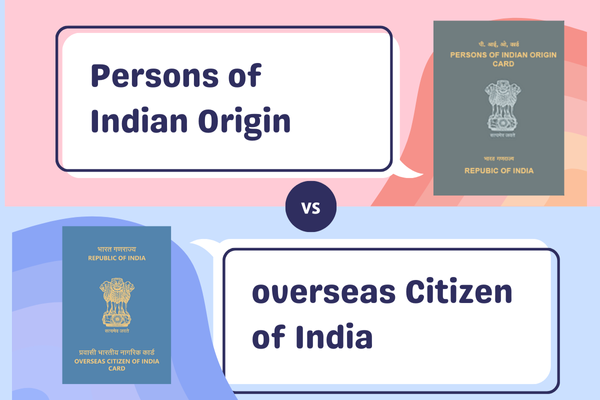Differences Between PIO and OCI

The primary difference between a person of Indian origin(PIO) and an overseas citizen of India (OCI) is rest in rights and freedom that the Indian government allows them. In this blog, we will explore the meaning of PIO and OCI, their advantages and disadvantages, and how they differ. Before moving towards Differences Between PIO and OCI let’s know about what is PIO.
What is PIO?
PIO means a persons of Indian origin, it refers to a person who holds an Indian passport and whose parent and grandparent hold citizenship in India, as defined by the Government of India of Act 1935. The government of India, and the citizens of Pakistan, Bangladesh, China, Iran, Bhutan, Shri Lanka, Afghanistan, and Nepal were not eligible for PIO.
A PIO card was introduced in 1999.
Eligibility for PIO Card
- They or their parent or grandparent were an Indian citizen.
- They were not the citizen of Pakistan, Bangladesh, China, Iran, Bhutan, Shri Lanka, Afghanistan, and Nepal.
- spouses of Indian citizens were also eligible for PIO.
Benefits of PIO
PIO card brings a number of benefits. Here is the list of advantages:
- PIO cardholders can travel without a visa in India.
- They can stay in India for 15 years without needing any extra paperwork
- They have access to Indian educational institutes and healthcare facilities.
- They can buy secure property and participate in or invest in Indian businesses.
Document Required For PIO Status
Here is the list of the documents required for a PIO card:
- Photocopy of current passport. Valid for at least 6 months.
- Indian passport, birth certificate, or school transfer certificate showing Indian origin.
- Recent passport-sized photo.
- Address proof like electricity bill, bank statement.
- A certified marriage certificate if the applicant is married.
- Complete the application form from the Indian embassy.
What is OCI?
An overseas Citizen of India (OCI) is a position given to people who are citizens of another country but have the same rights and freedom as citizens of India.OCI Card is beneficial for traveling multiple times in India without needing a Visa, It is not citizenship, but the cardholders have permission to work and live within the restrictions of India. It also does not allow the right to vote in Indian elections and the Indian government does not allow Dual citizenship by the constitution of India that is why the government of India has launched the OCI card. before moving towards benefits let’s get some knowledge about eligibility criteria.
Eligibility criteria for an OCI card holder
who renounced their Indian citizenship can also apply for it.
- A person whose parents, and grandparents, were Indian citizens.
- You should have an existing OCI for at least 2 years.
- If you before gave up Indian citizenship.
- A minor whose choice one or both parents are a citizen of India is eligible for OCI status.
- You must be a child, grandchild, or great-grandchild of an Indian citizen.
Benefits of OCI Card
OCI brings a number of benefits with it, here is the list of advantages
- No need to report the authorities for a long-term stay in India.
- Avail of the same benefits provided to citizens of India.
- It provides visa-free entry in India.
- Provide the same rights as the citizens of India.
Document Required for OCI Card
Here is the list of documents required:
- A copy of their current valid passport.
- A copy of their Indian passport or their parents’ or grandparents’ Indian passport.
- Proof of renunciation of Indian citizenship, if applicable.
- Birth certificate as proof of family tiesto a former Indian citizen.
- Proof of residency in the current country.
What Are the Difference Between PIO vs OCI
| Point of Different | PIO | OCI |
| VISA free travel | Valid for 15 years | Lifelong validity |
| Property right | Can buy agricultural land | Can buy personal and commercial property |
| Employment sector | Restricted from government job | Can work in most sectors except government |
| Processing Time | Normally longer, involving paperwork | Generally faster with an online OCI card application process |
| Educational opportunity | Limited access to educational benefits | Greater access to educational benefits |
| Financial rights | Cannot own agricultural land and limitations in investment | Can invest and conduct business more freely |
Conclusion
PIO and OCI status offer significant benefits to individuals of Indian origin. OCI provides more rights and fewer restrictions than PIO. Hope this blog makes your process stress-free and Hassle-free.